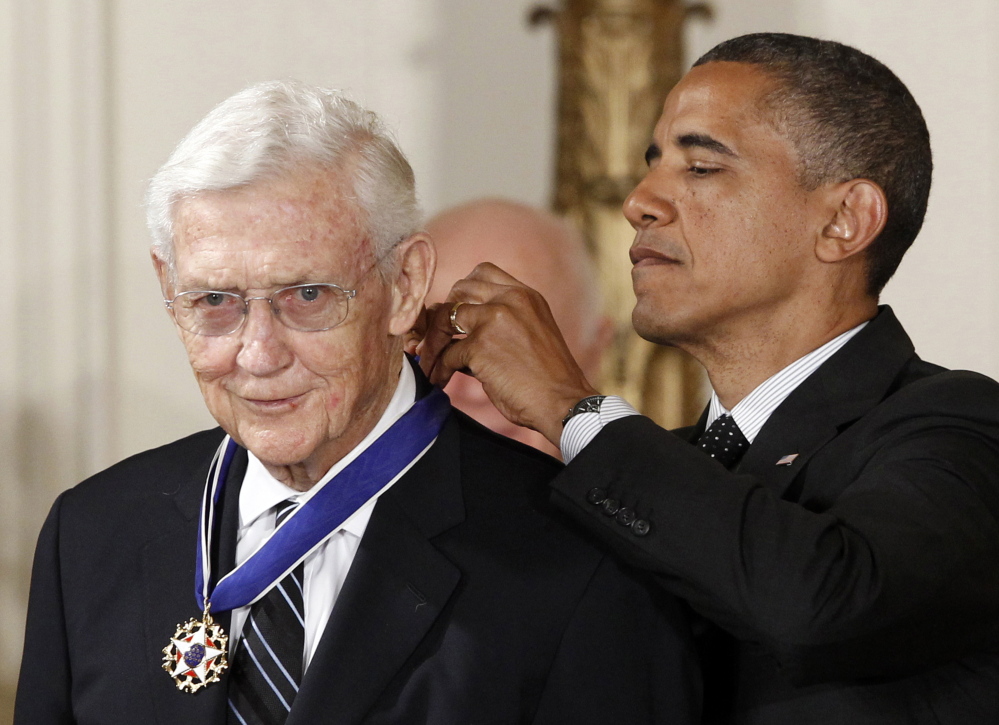John Doar, who was the chief federal presence in the South during the civil rights era of the 1960s, leading Justice Department prosecutions of the Ku Klux Klan and accompanying the first black student onto the campus of the University of Mississippi, died Tuesday at his home in New York City. He was 92.
The cause was congestive heart failure, said a son, Robert Doar.
After serving as assistant attorney general, John Doar drafted articles of impeachment against President Nixon as a special counsel to the U.S. House of Representatives in 1973 and 1974.
Doar, who grew up in an all-white town in Wisconsin, joined the Justice Department in 1960. He was the second-ranking lawyer in the civil rights division for four years and then directed the division from 1964 to 1967 during one of the most turbulent periods in the country’s history.
“Every major step in the South in those days – he was there,” Rep. John Lewis, D-Ga., a civil rights advocate who survived brutal attacks in the 1960s, told the Gannett News Service in 2012.
In his seven years with the Justice Department, Doar led countless efforts to overturn discriminatory laws throughout the South. He successfully prosecuted the killers of civil rights workers James Chaney, Andrew Goodman and Michael Schwerner in Mississippi. He won a conviction against the triggerman in the killing of Viola Liuzzo, a civil rights activist and mother of five who was shot while driving on an Alabama highway in 1965.
With a dry, business-as-usual manner, Doar handled dozens of voting rights cases in almost every state of the Deep South. He was sometimes in courtrooms in three states on the same day, and his courage was recognized by people on every side of the civil rights battles.
Doar’s work was credited with laying the groundwork for passage of the Civil Rights Act of 1964 and the Voting Rights Act of 1965. He was awarded the Presidential Medal of Freedom by President Obama in 2012.
In a statement, Obama called Doar “one of the bravest American lawyers of his or any era. Time and time again, John put his life on the line to make real our country’s promise of equal rights for all.”
In September 1962, Doar sought to enroll James Meredith as the first African American student at the University of Mississippi, only to be turned away by the state’s governor, Ross Barnett.
Returning with a court order and a protective cordon of U.S. marshals, Doar secured Meredith’s enrollment at the university and then spent the night at Meredith’s side in a dormitory as a riot erupted that left two people dead and 160 federal marshals injured.
Former Time magazine correspondent Arlie Schardt recalled to the Milwaukee Journal in 2009 that Doar rescued him from the back of a police car in Mississippi in 1966. “None of us can figure out how or why John lived through that era,” Schardt said.
John Michael Doar was born Dec. 3, 1921, in Minneapolis, and grew up in New Richmond, Wisconsin. After receiving his law degree from the University of California at Berkeley in 1949, he returned to his hometown to practice law with his father.
A distant Princeton connection led to a job offer from the Justice Department during the administration of Dwight D. Eisenhower. Doar, a lifelong Republican, stayed on through the administrations of John F. Kennedy and Lyndon B. Johnson.
He left the Justice Department in 1967 to lead an anti-poverty effort in Brooklyn. Then he served as head of the New York City school board under Mayor John Lindsay.
In 1973, Doar returned to Washington as special counsel to the House Judiciary Committee, leading an impeachment inquiry of Nixon’s activities during the Watergate scandal. One of the lawyers working for him at the time was Hillary Rodham Clinton.
“As an individual,” Doar wrote in drafting articles of impeachment against Nixon in July 1974, “I have not the slightest bias against President Nixon. I would hope that I would not do him the smallest, slightest injury. But I am not indifferent, not indifferent to the matter of presidential abuse of power.”
Nixon resigned three weeks later.
Doar did not write about his career and seldom spoke in public settings about his dramatic career during the civil rights era.
“I’m a lawyer,” he said in 1973, when he was named special counsel to the House Judiciary Committee. “I like to take on difficult cases. I like to prepare cases. To me, success is seeing that justice is done, that the Constitution is preserved and fairness occurs.”
Copy the Story LinkSend questions/comments to the editors.



Success. Please wait for the page to reload. If the page does not reload within 5 seconds, please refresh the page.
Enter your email and password to access comments.
Hi, to comment on stories you must . This profile is in addition to your subscription and website login.
Already have a commenting profile? .
Invalid username/password.
Please check your email to confirm and complete your registration.
Only subscribers are eligible to post comments. Please subscribe or login first for digital access. Here’s why.
Use the form below to reset your password. When you've submitted your account email, we will send an email with a reset code.